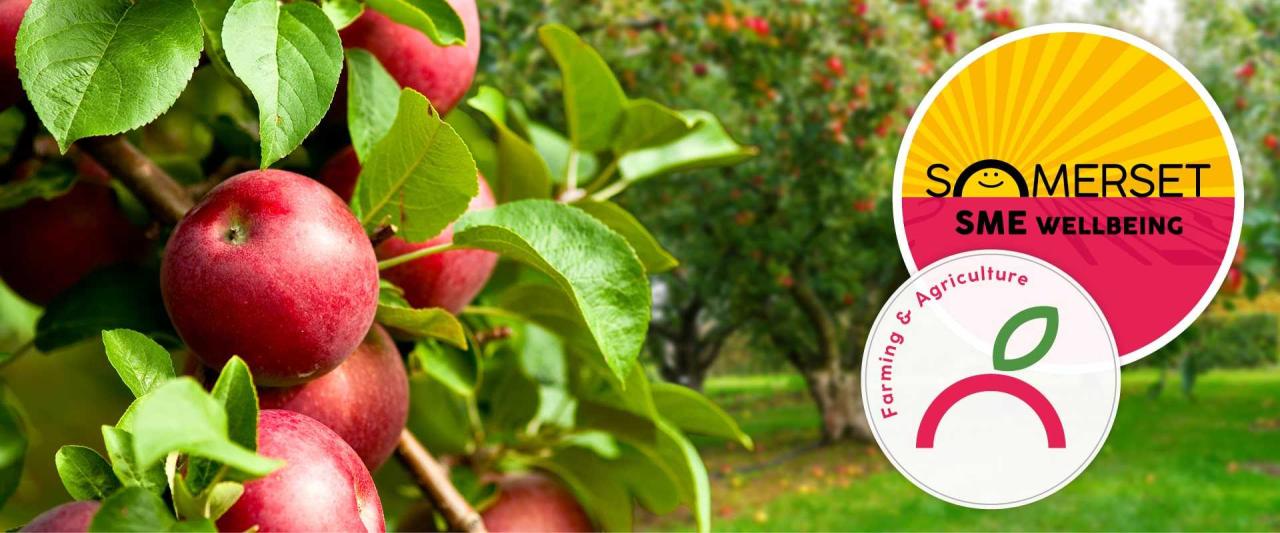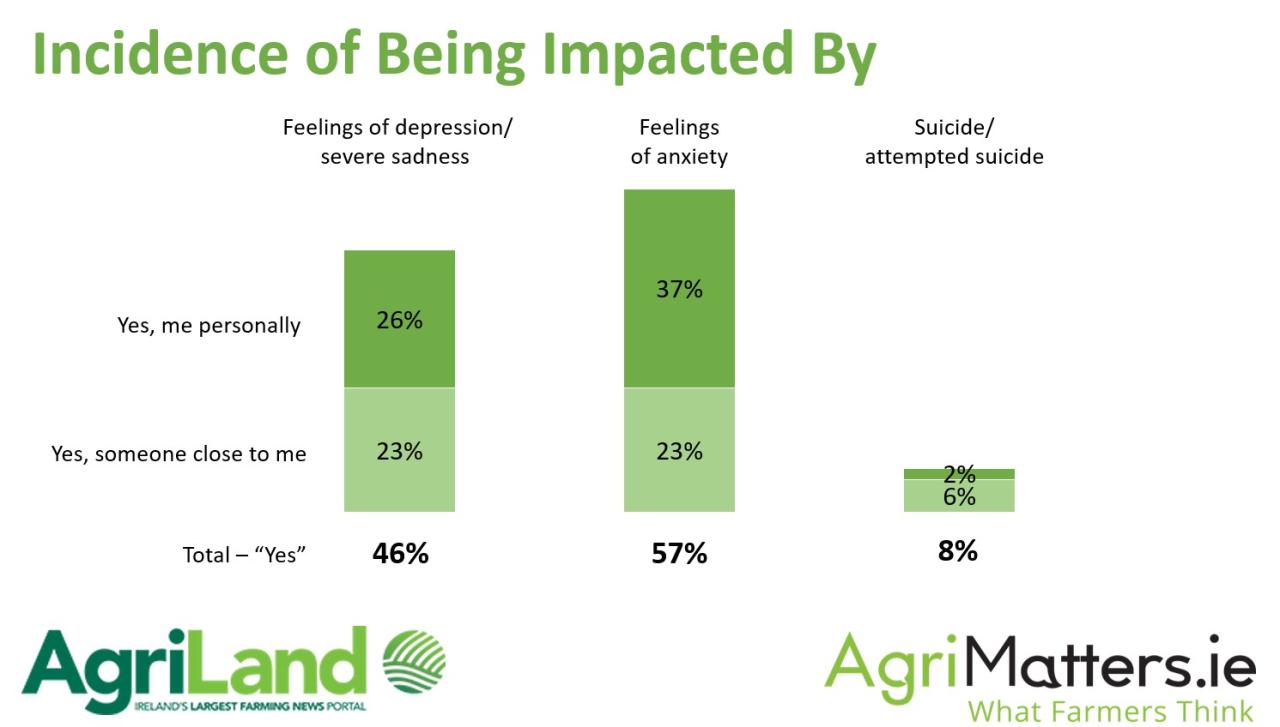The mental health and wellbeing of millennial farmers is no longer a whispered concern; it’s a full-blown barnstorming conversation! These modern-day agricultural superheroes face unique challenges, from crippling debt and climate anxiety to the relentless pressure of social media and technological advancements. Forget romantic sunsets and idyllic fields – we’re diving headfirst into the realities of a generation grappling with stress, isolation, and the weight of feeding the world.
Buckle up, it’s going to be a bumpy, but insightful, ride.
This exploration delves into the specific economic pressures, prevalent mental health concerns, and the impact of climate change on millennial farmers. We’ll examine the role of technology, both its benefits and drawbacks, and explore strategies for fostering community support and improving access to mental health services. We’ll also uncover effective self-care practices and policy recommendations to support this vital generation.
Unique Challenges Faced by Millennial Farmers

Millennial farmers, those who entered the profession around the turn of the 21st century, face a unique cocktail of challenges unlike those faced by previous generations. They’re navigating a rapidly changing agricultural landscape, grappling with economic pressures, environmental anxieties, and a mental health crisis often overlooked. Their story is one of resilience, innovation, and a desperate need for support.
Economic Pressures on Millennial Farmers
Millennial farmers often inherit land burdened by debt, a legacy from previous generations’ farming practices. Unlike their predecessors who might have benefited from government subsidies designed for a different agricultural model, millennials face tighter margins, fluctuating commodity prices, and the increasing cost of land, equipment, and technology. This economic squeeze is exacerbated by the pressure to adopt sustainable practices, which can initially be more expensive than conventional methods.
Many find themselves caught in a cycle of working harder for less, leading to significant financial stress and impacting their overall well-being. For example, a young farmer in Iowa might struggle to compete with larger, corporate farms that have access to economies of scale and cheaper inputs.
Mental Health Concerns Among Millennial Farmers
The intense pressure of managing a farm, coupled with economic instability and environmental concerns, significantly impacts the mental health of millennial farmers. While precise statistics are difficult to obtain due to underreporting and a stigma surrounding mental health in rural communities, anecdotal evidence and limited studies suggest high rates of anxiety, depression, and burnout. The isolation inherent in farming, often compounded by long working hours and the unpredictable nature of weather and markets, can further exacerbate these issues.
The feeling of constant responsibility for the livelihood of their families and the land itself can be overwhelming.
Impact of Climate Change and Environmental Concerns
Climate change is no longer a distant threat; it’s a daily reality for millennial farmers. More frequent and intense extreme weather events – droughts, floods, wildfires – directly impact crop yields and livestock health, causing significant financial losses and emotional distress. The added pressure of adapting to a changing climate, implementing sustainable farming practices, and managing the environmental impact of their operations adds another layer of complexity and anxiety to an already demanding profession.
Imagine a California almond farmer struggling with prolonged drought, facing the agonizing decision of whether to sell their land or risk further financial ruin.
Access to Mental Health Resources for Millennial Farmers
Access to mental health resources for millennial farmers often lags behind that of other professions. Rural communities frequently face shortages of mental health professionals, long waiting lists, and limited access to telehealth services. The stigma associated with seeking mental health support, particularly within a traditionally stoic agricultural community, further complicates matters. The lack of readily available and affordable mental health services creates a significant barrier to seeking help, leaving many millennial farmers struggling in silence.
This disparity highlights the urgent need for increased investment in rural mental health services and targeted outreach programs designed to reach and support this vulnerable population.
Impact of Technology and Modern Farming Practices
The digital age has undeniably revolutionized agriculture, bringing both bountiful harvests and a hefty dose of stress to the plates of millennial farmers. While technology promises efficiency and increased yields, it also introduces a new set of challenges that impact their mental wellbeing, blurring the lines between work and personal life in ways previous generations couldn’t have imagined. This section explores the double-edged sword of technological advancements in modern farming, examining its impact on the mental health and self-perception of this crucial generation of agriculturalists.
The Double-Edged Plow: Technology’s Impact on Workload and Stress
The relentless connectivity demanded by modern farming practices contributes significantly to increased workload and stress. Millennial farmers are constantly bombarded with data from sensors, GPS systems, and farm management software. They are expected to monitor yields in real-time, analyze soil conditions remotely, and troubleshoot equipment malfunctions, often at all hours of the day and night. This constant pressure to optimize every aspect of the operation can lead to burnout, sleep deprivation, and a pervasive sense of being “always on.” Imagine the farmer constantly checking their phone for soil moisture readings even during a family dinner – this isn’t an exaggeration for many.
The pressure to stay competitive in a data-driven industry also adds to the mental burden.
Millennial farmers face unique mental health challenges, juggling unpredictable harvests with the weight of the world on their shoulders. Their quest for environmentally friendly practices, however, might offer a surprising antidote; check out this insightful article on Millennial farmers and the adoption of sustainable farming practices to see how a connection to nature can positively impact their wellbeing.
Ultimately, finding balance between sustainable farming and mental wellness is key to their success.
Social Media’s Influence on Self-Perception and Mental Health
Social media presents a complex picture for millennial farmers. While platforms like Instagram and TikTok offer opportunities to connect with other farmers, share best practices, and build community, they also contribute to a culture of comparison and unrealistic expectations. The curated perfection often showcased online can lead to feelings of inadequacy and self-doubt, especially when a farmer’s own reality involves long hours, unpredictable weather, and financial anxieties.
The constant stream of idealized farm life can be disheartening for those struggling with the realities of the profession. For example, a farmer seeing countless posts of picturesque harvests might feel pressure to achieve the same, ignoring the potential impact of stress on their well-being.
Precision Agriculture: A Balanced View
| Benefit | Drawback | Impact on Mental Health | Mitigation Strategy |
|---|---|---|---|
| Increased efficiency and yield | High initial investment costs and complex technology | Reduced workload in the long run, but initial stress from learning curve | Invest in training and mentorship programs; phased implementation |
| Improved resource management (water, fertilizer) | Data overload and constant monitoring requirements | Potential for burnout and anxiety from constant data analysis | Utilize data analysis tools that automate reporting; establish clear boundaries between work and personal time |
| Reduced environmental impact | Technical malfunctions and downtime | Frustration and financial losses from equipment failures | Invest in reliable equipment and service contracts; develop contingency plans |
| Better decision-making based on data | Dependence on technology and potential for cyber threats | Vulnerability and anxiety related to data security and system failures | Implement robust cybersecurity measures; diversify data storage and backup systems |
A Tech-Powered Support System for Millennial Farmers
A hypothetical support system could leverage technology to improve the mental health of millennial farmers. This system would incorporate a mobile app offering: a peer-to-peer support forum moderated by mental health professionals, access to mindfulness and stress-management resources (guided meditations, breathing exercises), a personalized dashboard tracking farming metrics alongside mental wellbeing indicators (sleep, stress levels, etc.), and integration with farm management software to flag potential stressors (e.g., equipment malfunctions or weather alerts) and trigger automated support messages.
This approach combines the benefits of technology with human connection, providing a proactive and personalized support system.
Social Isolation and Community Support

Millennial farmers, often juggling the demands of modern agriculture with the isolating realities of rural life, face a unique set of challenges impacting their mental wellbeing. While technology connects them globally, it can paradoxically deepen feelings of loneliness and disconnect from their immediate community. This section explores the pervasive issue of social isolation among millennial farmers, its consequences, and strategies for building stronger, more supportive networks.The sheer physical distance between farms and the long, unpredictable hours demanded by agriculture contribute significantly to social isolation.
Imagine a young farmer, miles from the nearest town, working dawn till dusk, rarely seeing anyone beyond their family. This lack of regular social interaction can lead to feelings of loneliness, depression, and even anxiety. The pressure to succeed, coupled with financial instability common in farming, can exacerbate these feelings, creating a perfect storm for mental health issues.
One farmer we spoke to described the experience as feeling like “a lone wolf howling into the wind,” highlighting the profound sense of isolation many experience. This isolation can manifest in delayed seeking of help, as the stigma surrounding mental health in rural communities can be significant, making it harder for individuals to reach out for support. Consequently, untreated mental health challenges can lead to burnout, reduced productivity, and even in extreme cases, suicidal ideation.
Examples of Social Isolation and its Consequences
Social isolation among millennial farmers manifests in various ways, each with potentially serious consequences. For instance, the lack of regular social interaction can lead to feelings of loneliness and depression. The pressure to maintain a successful farm, often in the face of unpredictable weather patterns and fluctuating market prices, can exacerbate existing mental health challenges. Many millennial farmers report struggling to find time for personal relationships and social activities due to the demanding nature of their work.
This can lead to strained family relationships and a general sense of isolation from their peers. The absence of a supportive community can also make it more difficult to cope with stress and adversity, increasing the risk of burnout and mental health crises. Furthermore, the stigma surrounding mental health in rural areas can deter farmers from seeking help, worsening their situation.
Strategies to Foster Community Among Millennial Farmers
Building strong communities for millennial farmers requires a multi-pronged approach. Firstly, leveraging technology to connect farmers is crucial. Online forums, social media groups, and even dedicated apps can provide spaces for farmers to share experiences, seek advice, and build relationships. These online platforms can be particularly valuable for those geographically isolated. Secondly, organizing regular in-person events, such as workshops, farm tours, and social gatherings, can foster a sense of belonging and camaraderie.
Millennial farmers face unique mental health challenges, juggling tradition with tech and battling unpredictable markets. Understanding these pressures requires looking at the stark differences between approaches; for a fascinating deep dive into this, check out this comparison of traditional and millennial farming methods: Comparison of traditional and millennial farming methods. Ultimately, recognizing these contrasting styles is crucial for supporting the mental wellbeing of this vital generation of food producers.
These events should focus on providing both practical farming advice and opportunities for social interaction. Finally, fostering collaboration between farmers through cooperative ventures can create a stronger sense of shared purpose and mutual support. This might involve sharing resources, equipment, or even marketing strategies.
Potential Community Initiatives for Improved Mental Wellbeing
Creating supportive communities requires proactive initiatives.
- Peer Support Groups: Establishing peer-support groups where farmers can share their experiences and provide mutual support in a confidential and non-judgmental environment.
- Mental Health Awareness Campaigns: Raising awareness about mental health issues within the farming community through targeted campaigns that challenge stigma and encourage help-seeking behavior.
- Farm Wellness Programs: Developing comprehensive wellness programs that offer farmers access to mental health services, stress management techniques, and other resources that promote wellbeing.
- Mentorship Programs: Connecting experienced farmers with younger generations to provide guidance, support, and a sense of community.
- Rural Community Centers: Establishing or enhancing rural community centers to serve as hubs for social interaction, educational workshops, and access to support services.
The Role of Family and Peer Support in Mitigating Mental Health Challenges
Family and peer support are invaluable in mitigating mental health challenges for millennial farmers. A strong support network can provide a buffer against stress, loneliness, and isolation. Family members can offer practical assistance, emotional support, and a sense of belonging. Peers, who understand the unique challenges of farming, can provide empathy, encouragement, and shared experiences. Open communication and a willingness to seek help are essential for effective family and peer support.
Farmers should feel comfortable talking openly about their struggles without fear of judgment. Family and friends can play a crucial role in encouraging farmers to seek professional help when needed. The presence of a strong support network can significantly improve the mental wellbeing of millennial farmers and help them navigate the difficulties of farming life.
Work-Life Balance and Self-Care Strategies

Millennial farmers face a unique pressure cooker of responsibilities: the relentless demands of modern agriculture, the weight of inherited family legacies (or the pressure to build one from scratch), and the ever-present anxieties of fluctuating markets and unpredictable weather. Ignoring the need for work-life balance in this context isn’t just unwise; it’s a recipe for burnout and compromised mental well-being.
Finding time for self-care isn’t selfish; it’s essential for sustainable farming and a fulfilling life.Work-life balance is crucial for the mental health of millennial farmers because it prevents burnout and fosters resilience. Without dedicated time for rest and rejuvenation, the constant stress of farming can lead to exhaustion, anxiety, and depression. A balanced approach allows for better decision-making, improved physical health, and stronger relationships, all contributing to a more positive and sustainable farming operation.
Think of it like this: a well-maintained tractor performs better than a neglected one; the same applies to the farmer behind the wheel.
Effective Self-Care Practices for Millennial Farmers
Implementing effective self-care isn’t about indulging in extravagant spa days (though those are nice!). It’s about integrating small, manageable practices into the daily routine. These practices should address the unique challenges of farming, such as physical demands, isolation, and unpredictable schedules. Consistent self-care acts as a buffer against stress and promotes overall well-being.
A Sample Daily Schedule Incorporating Stress Management Techniques
The following schedule is a template; adapt it to your specific circumstances and preferences. The key is consistency, not perfection.
| Time | Activity | Stress Management Technique |
|---|---|---|
| 6:00 AM | Morning routine (light exercise, meditation, journaling) | Mindfulness, physical activity |
| 7:00 AM – 12:00 PM | Farm work (focus on prioritized tasks) | Time management, delegation (if possible) |
| 12:00 PM – 1:00 PM | Lunch break (mindful eating, no phone) | Mindfulness, disconnecting from work |
| 1:00 PM – 5:00 PM | Farm work (continue with tasks, break for short walks) | Regular movement, breaks |
| 5:00 PM – 6:00 PM | Relaxation time (reading, listening to music, spending time with loved ones) | Social connection, hobbies |
| 6:00 PM – 7:00 PM | Dinner (family time, conversation) | Social connection, healthy eating |
| 7:00 PM – 9:00 PM | Personal time (hobbies, unwinding) | Hobbies, relaxation |
| 9:00 PM | Bedtime routine (reading, relaxing bath) | Sleep hygiene |
Comparison of Stress Management Techniques, The mental health and wellbeing of millennial farmers
Different techniques resonate with different people. Some millennial farmers might find solace in physical activity like running or weightlifting, while others might prefer mindfulness practices like meditation or yoga. Connecting with nature, through gardening or simply observing the landscape, can be incredibly therapeutic. Joining farmer support groups provides a crucial social outlet and a sense of community.
For those who find it helpful, seeking professional counseling offers a confidential space to process challenges and develop coping mechanisms. The key is to experiment and discover what works best for you, remembering that a combination of techniques often yields the best results. For instance, a farmer might start their day with a mindful walk through their fields, then utilize time management strategies throughout the day, and end the day with a relaxing bath and conversation with their family.
This multifaceted approach addresses both the physical and emotional demands of farming.
Access to and Utilization of Mental Health Services

Millennial farmers, already juggling the unpredictable nature of harvests, fluctuating market prices, and the ever-present threat of climate change, often face significant hurdles in accessing mental health services. These challenges aren’t just about a lack of resources; they’re woven into the fabric of rural life, creating a complex web of barriers that prevent many from seeking the help they need.
Let’s delve into the muddy boots and thorny realities of this situation.Barriers to accessing mental health services for millennial farmers are numerous and interconnected. Geographical isolation, for example, makes it difficult to reach specialists, especially in remote farming communities. Long travel distances, lack of transportation, and inflexible clinic hours clash with the demanding and often unpredictable schedule of farm work.
Furthermore, the cost of mental health services can be prohibitive, particularly when already facing financial pressures from operating a farm. Adding to this, the stigma associated with mental health within the farming community – a culture often steeped in stoicism and self-reliance – discourages many from seeking help, fearing judgment or perceived weakness. This pervasive stigma creates a silent suffering, where individuals struggle in isolation rather than reaching out for support.
Barriers to Accessing Mental Health Services
The challenges faced by millennial farmers in accessing mental health services are multifaceted and deeply rooted in the realities of rural life and agricultural work. Limited availability of mental health professionals in rural areas, coupled with the financial burden of treatment, often prevents timely intervention. The long working hours and unpredictable nature of farming operations further exacerbate access issues, making it difficult to schedule appointments or attend therapy sessions.
Moreover, the strong cultural stigma surrounding mental health within farming communities discourages help-seeking behavior. Many farmers are hesitant to disclose their struggles, fearing judgment from peers and a potential impact on their reputation or livelihood. This reluctance to seek professional help often leads to delayed treatment and worsening mental health conditions. Examples include farmers who delay seeking help for depression or anxiety, leading to increased stress and decreased productivity, or those who avoid discussing their mental health concerns with their families, fearing misunderstanding or rejection.
Recommendations for Improving Access to Mental Health Services
Improving access to affordable and accessible mental health services for millennial farmers requires a multi-pronged approach. This includes expanding telehealth services to bridge geographical barriers, offering sliding-scale fees or subsidized treatment options to address financial concerns, and establishing mental health clinics specifically tailored to the needs and schedules of farmers. Furthermore, promoting mental health awareness and reducing stigma through educational campaigns and peer support groups can encourage help-seeking behaviors.
Integrating mental health professionals into existing agricultural support networks, such as farm extension offices or agricultural cooperatives, would also improve accessibility. Consider, for instance, a mobile mental health clinic that travels to different rural areas, offering convenient access to services without the need for extensive travel. Or perhaps a farmer-to-farmer mentorship program where experienced farmers with good mental health support newer farmers facing challenges.
Benefits of Integrating Mental Health Support into Agricultural Support Programs
Integrating mental health support into existing agricultural programs offers significant benefits. It normalizes help-seeking behavior, reducing stigma and encouraging early intervention. Early intervention is crucial in preventing mental health conditions from escalating and impacting farmers’ well-being, productivity, and overall quality of life. By embedding mental health resources within established agricultural support systems, farmers can access services more easily and conveniently, potentially leading to improved mental health outcomes and a more resilient farming community.
For example, integrating mental health screenings into routine farm visits by agricultural extension agents could identify individuals who need support and connect them with appropriate services. This proactive approach can significantly improve early detection and treatment of mental health issues.
Reducing Stigma Surrounding Mental Health in the Farming Community
Reducing stigma is paramount. Open conversations, educational campaigns targeting farmers and their families, and promoting positive narratives about mental health are crucial steps. Sharing personal stories of recovery, highlighting the strength and resilience demonstrated by farmers who seek help, and creating a culture of support and understanding can help dismantle the stigma and encourage help-seeking. Initiatives that foster community engagement, such as farmer support groups and workshops focused on mental well-being, can create safe spaces for sharing experiences and reducing isolation.
The goal is to create an environment where seeking help is viewed not as a sign of weakness, but as a testament to strength and a commitment to one’s well-being. For example, a successful campaign could involve local farmers sharing their experiences anonymously through testimonials or short videos, highlighting the positive impact of seeking professional help.
Final Review: The Mental Health And Wellbeing Of Millennial Farmers
So, the tractors may be shiny and the technology impressive, but the emotional toll on millennial farmers is undeniable. This isn’t just about bigger yields; it’s about building a support system as strong as the land they cultivate. By addressing the unique challenges they face, fostering community, and prioritizing mental wellbeing, we can ensure a future where these farmers not only thrive but flourish.
Let’s raise a glass (of organic, locally sourced, sustainably farmed juice, of course!) to their resilience and the brighter future we can build together.
